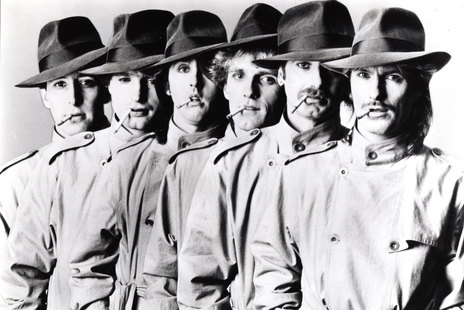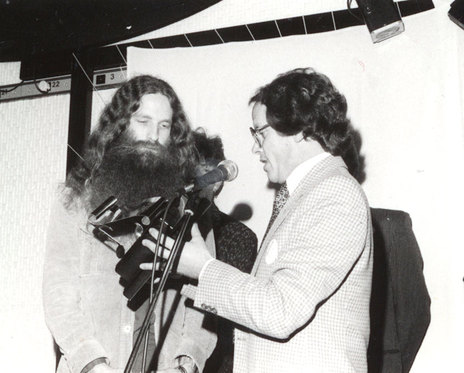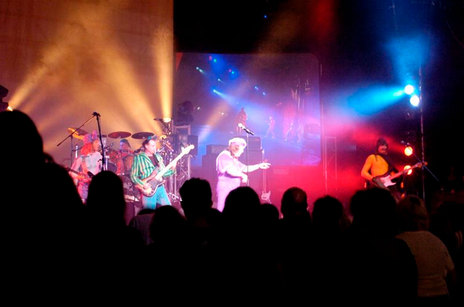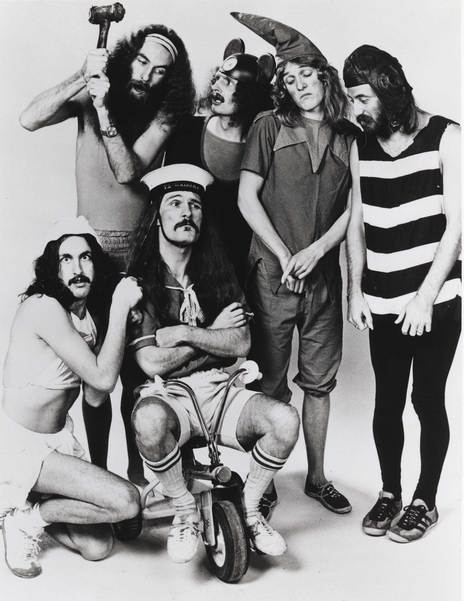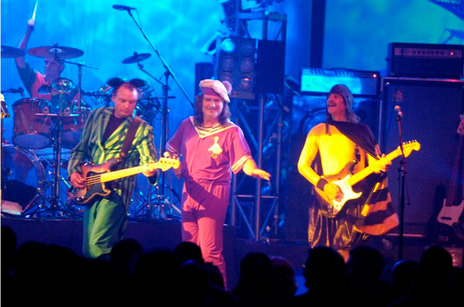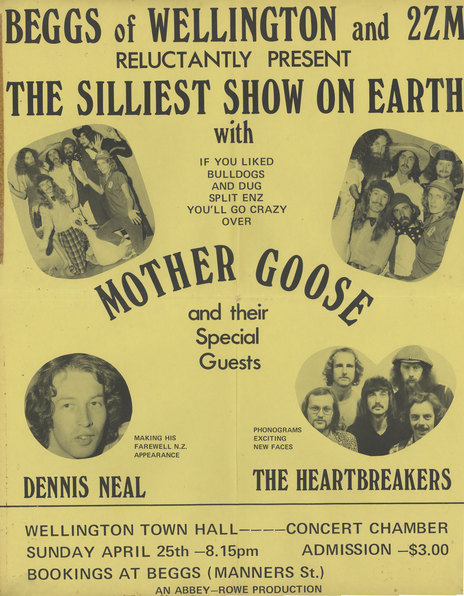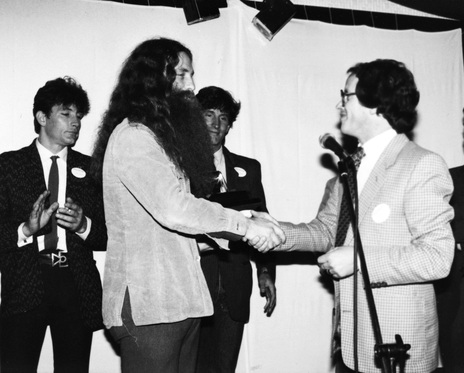After three weeks of rehearsal they were playing to the public in December that year. They were well received on the pub circuit, playing the Shoreline in Dunedin and the Aranui in Christchurch. In early 1976 they headed for Auckland where the highlight of their stay was playing a free Radio Hauraki concert in Albert Park.
They boarded a plane for Australia, where their press release said that they "drove too far north of Auckland and arrived in Brisbane.”
In October 1976, they boarded a plane for Australia, where their press release said that they "drove too far north of Auckland and arrived in Brisbane.” Their Aussie posters read "Deported direct from New Zealand and now we're stuck with them."
The band had an eccentric live act that involved each band member having his own costume and persona: Kevin Collings (bee), Peter Dickson (baby), Denis Gibbins (mouse), Craig Johnston (sailor), Marcel Rodeka (pixie) and Steve Young (ballerina). Like Split Enz, they owned a debt to the English tradition of theatrical rock, rather than the commercial rock traditions of the USA.
Mother Goose were an immediate hit on the Australian live circuit and got themselves an ambitious Australian manager Garry Spry (aka Father Goose). On April Fools Day 1977, the band were signed to Melbourne independent label Mushroom Records. The novelty single 'Baked Beans' and its memorable video would make them and break them. The single was released in July 1977, and the album Stuffed in August 1977. The single went to No.23 on the Australian sales charts but was Top 20 in many cities, going to No.4 in Adelaide. The band became even more popular on the live circuit but in the long term they were not dressed for success. It would be very hard for the band to be taken seriously in the future.
In October 1977 Mother Goose returned home and played a popular set at the Hinuera Festival, near Matamata on Labour Weekend, Sunday October 23. The planned New Zealand tour was cancelled, as “overheads were just too high to make it feasible,” singer Craig Johnston told RipItUp. The band returned to Australia late November to headline a national tour. "We should have cleared our debts after a few months in Australia and then we can get a whole lot of new ones in America," said Johnston.
In RipItUp (November 1977) Adrian Picot wrote of their Hinuera performance, "They gooned about à la Split Enz in assorted costumes. The usual satire-rock clichés (Sound Of Music mimicry, solos that would not die etc.). Rather a pity really, since musically they were really together. Cut the ham, lads and the real big time should be ripe for the plucking."
Terence Hogan reviewed their debut album in the same issue of RipItUp magazine. "As a band they've walked a fine line with the pitfalls of terminal cuteness and rampant eclecticism on either side. The good news is that in the cold light of vinyl they continue to walk the line better than many folk might have anticipated. Well-absorbed lessons in rock dynamics and a freshness and originality that reveal a genuine love and talent for pop are all exhibited to varying degrees in Stuffed. These guys sound like they are close to the music and get a big kick out of it."
In December 1977 'Baked Beans' entered the NZ Singles Chart at No.37 but it dropped off the chart in the following week.
In June 1978 Mother Goose headed for the USA, where they had a frustrating time working with Scotti Brothers Records. They returned to Australia in February 1979 with a new American guitarist Justin McCarthy replacing Peter Dickson. The band's second album Don't Believe In Fairytales was released late 1979 on Mushroom Records.
Mother Goose got their first nod from the New Zealand music industry when Steve Young won the APRA Silver Scroll Award for his composition 'I Can't Sing Very Well' from the band's third album.
In the 1981 press release for a mid-year New Zealand tour, there were sharp comments concerning their Australian music business experiences. "As with many successful bands the group had also been ‘used’ by several parts of the Australian rock industry, and so in 1981 Mother Goose has taken bold steps to solve both of these problems."
By 1981 the band was no longer with Mushroom Records (NZ distribution by Festival Records) and had moved to Parole Records, represented by WEA Records (now known as Warner Music) in New Zealand. The band's tour press release also comments on the band's lack of success in their home country. "1981 also sees Mother Goose setting about solving their other frustration, that is their aloofness to New Zealand audiences over the past few years through their absences in Australia and the USA. This has largely been caused by the lack of NZ record company support and exclusive Australian Management, who wouldn't acknowledge New Zealand's existence despite the band's insistence that it was right-hand-down-a-bit."
Australia's Juke magazine reported another change for Mother Goose. 'Baked Beans' had been dropped from their repertoire. The group's third album This Is The Life was released in 1982. The same year Mother Goose got their first nod from the New Zealand music industry when Steve Young won the APRA Silver Scroll Award for his composition 'I Can't Sing Very Well' from the band's third album. Mother Goose continued to tour in Australia with Neil Shilkin replacing Young on keyboards. The band broke up in 1984.
For the inaugural Dunedin Heritage Festival, Mother Goose reformed to play at the Regent Theatre on Friday March 23, 2007. The Re:Sound Three Decades of Dunedin Sound concert also featured The Chills, Sneaky Feelings, The Clean and contemporary groups.
Argus, the group who contributed three band members to Mother Goose have reunited more regularly in recent years, including a December 31, 2011 performance in the Octagon, Dunedin.
